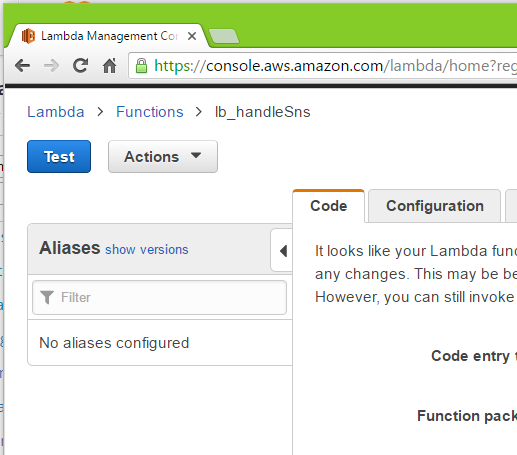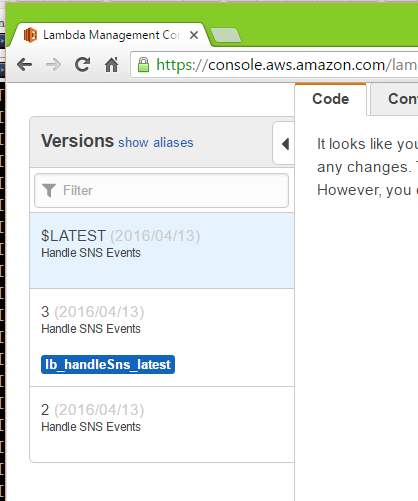Versioning
Versioning was the first feature added to Lambda once its inception. Here's how it works:
- You call the CreateFunctionCode call, which registers a function named
lb_handleSnswith two Amazon Resource Names (ARNs), like:arn:aws:lambda:us-east-1:235368163414:function:lb_handleSnsandarn:aws:lambda:us-east-1:235368163414:function:lb_handleSns:$LATEST
- When you call the
invokemethod of Lambda, you can either specify its function name (lb_handleSns) or the full ARN to the function (using the examples above, both will refer to the latest version of the version) - However, when you call the
UpdateFunctionCodeon an existing function with thepublishattribute set to true, the old$LATESTversion will be renamed toarn:aws:lambda:us-east-1:235368163414:function:lb_handleSns:1, thus allowing you to invoke the previous version
For more details, here is the AWS Reference on Versioning.
Using Versions and Aliases on Lambada
Lets look at the sns-example project for now. It declares an alias:
It defines an alias:
public class SNSEventHandler {
@LambadaFunction(name="lb_handleSns", alias="lb_handleSns_latest", description="Handle SNS Events")
public void handleSNSEvent(SNSEvent snsEvent) throws Exception {
System.out.println("snsEvent: " + snsEvent);
}
}
For now, just deploy the first version (with verbose logging, so we can track its API calls):
$ mvn -f sns-example/pom.xml -Pdeploy deploy -Dbeanstalker.verbose=true
...
[INFO] Merged into 1 definitions:
[INFO] Deploying Function: lb_handleSns (handler: io.ingenieux.lambada.SNSEventHandler::handleSNSEvent)
[INFO] Function does not exist. Creating it instead.
[INFO] SUCCESS
[INFO] {
[INFO] "lb_handleSns" : {
[INFO] "name" : "lb_handleSns",
[INFO] "alias" : "lb_handleSns_latest",
[INFO] "description" : "Handle SNS Events",
[INFO] "memorySize" : 128,
[INFO] "role" : "arn:aws:iam::235368163414:role/lambda_basic_execution",
[INFO] "timeout" : 5,
[INFO] "handler" : "io.ingenieux.lambada.SNSEventHandler::handleSNSEvent"
[INFO] }
[INFO] }
[INFO] ------------------------------------------------------------------------
[INFO] BUILD SUCCESS
[INFO] ------------------------------------------------------------------------
If you look at the console, there'll be no mention of version nor aliases declared:

Here's what happens: The Lambda Maven Plugin for Beanstalker doesn't have versioning (including Aliases) turned on by default:
/**
* Publish a new function version?
*/
@Parameter(property = "lambda.deploy.publish", defaultValue = "false")
Boolean deployPublish;
/**
* Publish a new function version?
*/
@Parameter(property = "lambda.deploy.aliases", defaultValue = "false")
Boolean deployAliases;
So, If you run declaring lambda.deploy.publish, versions will be made. Say, overriding via commandline:
$ mvn -f sns-example/pom.xml -Pdeploy -Dlambda.deploy.publish=true
The same also applies to aliases:
$ mvn -f sns-example/pom.xml -Pdeploy -Dlambda.deploy.publish=true -Dlambda.deploy.aliases=true
Here's the result:

Alternate Views on Versioning
We also support a property-based take on names. Replace the annotation on the example above from:
@LambadaFunction(name="lb_handleSns", alias="lb_handleSns_latest", description="Handle SNS Events")
public void handleSNSEvent(SNSEvent snsEvent) throws Exception {
To:
@LambadaFunction(name="lb_handleSns", alias="lb_handleSns_${environmentName}", description="Handle SNS Events")
public void handleSNSEvent(SNSEvent snsEvent) throws Exception {
These values will be interpolated by lambda-maven-plugin AND written back to disk. For instance, run lambada:generate and example the contents of target/META-INF/lambda-definitions.json:
$ mvn -f sns-example/pom.xml -Pdeploy clean compile lambada:generate -DenvironmentName=dev
Then lambda-definitions.json will be:
[ {
"name" : "lb_handleSns",
"alias" : "lb_handleSns_${environmentName}",
"description" : "Handle SNS Events",
"handler" : "io.ingenieux.lambada.SNSEventHandler::handleSNSEvent"
} ]
Now, run this:
$ mvn -f sns-example/pom.xml -Pdeploy clean deploy -DenvironmentName=dev
The contents of lambda-definitions.json will be:
[ {
"name" : "lb_handleSns",
"alias" : "lb_handleSns_dev",
"description" : "Handle SNS Events",
"memorySize" : 128,
"role" : "arn:aws:iam::235368163414:role/lambda_basic_execution",
"timeout" : 5,
"handler" : "io.ingenieux.lambada.SNSEventHandler::handleSNSEvent",
"api" : null
} ]